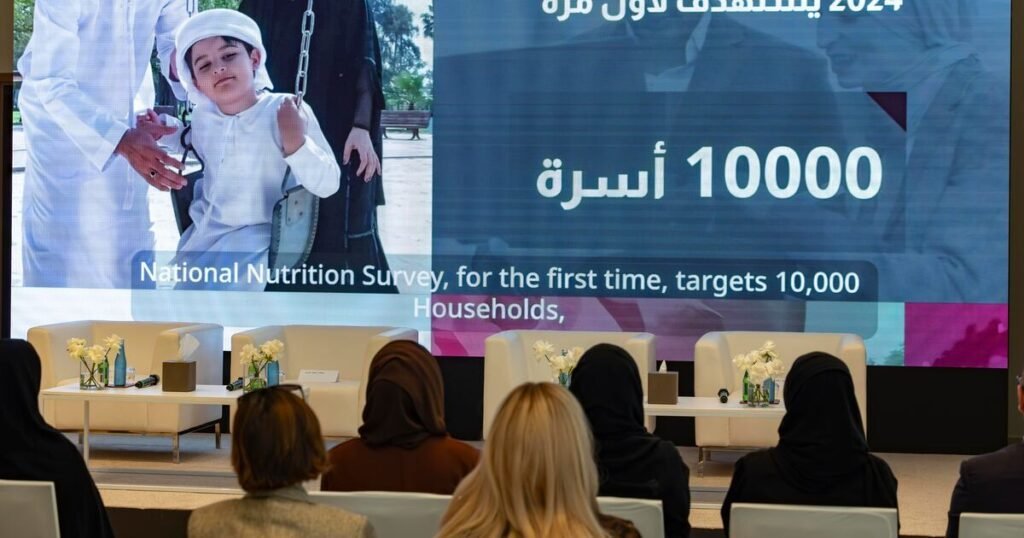The Ministry of Health and Prevention (MoHAP) is set to wrap up the National Health and Nutrition Survey, a comprehensive study aimed at understanding the well-being of residents across the UAE. This large-scale initiative collected crucial data on public health trends, lifestyle habits, and nutrition patterns. Now, as the survey reaches its conclusion, the results are expected to shed light on key health challenges and guide future healthcare strategies.
What Is the National Health and Nutrition Survey?
The National Health and Nutrition Survey is a nationwide effort carried out every few years to assess the health status of the population. By gathering data on issues like obesity, diabetes, heart disease, and dietary habits, the survey helps policymakers make informed decisions. Thousands of participants from various age groups and backgrounds took part in the study, ensuring a diverse and inclusive representation.
This initiative also included comprehensive health screenings, detailed questionnaires, and nutritional assessments. Advanced technologies and digital health applications played a crucial role in streamlining data collection, ensuring accurate and timely results. Health professionals were actively involved in conducting assessments and providing valuable insights.

Key Areas of Focus

The survey examined various aspects of health, including:
- Obesity and Weight Management: With obesity rates rising globally, the UAE is focused on understanding its prevalence and causes. Body mass index (BMI) data and waist circumference measurements were recorded to provide a clear picture of obesity levels.
- Chronic Diseases: Data on diabetes, cardiovascular diseases, and hypertension were gathered to assess the effectiveness of current health interventions. Blood pressure and blood sugar levels were key indicators assessed during the study.
- Nutrition and Diet Patterns: Understanding what people eat daily helps identify gaps in nutrition and areas for improvement. Dietary surveys examined food intake, hydration habits, and reliance on processed foods.
- Mental Health: With growing awareness around mental health, the survey also included questions related to stress, anxiety, and emotional well-being. Sleep patterns and coping mechanisms were evaluated as well.
- Physical Activity Levels: The study explored how often people engage in physical activities and the impact on their overall health. Data on exercise routines, sedentary behaviors, and participation in sports were collected.
Why This Survey Matters
The findings will play a crucial role in shaping public health policies and medical services in the UAE. By identifying the most common health issues, the government can introduce targeted programs to promote healthier lifestyles and reduce the prevalence of diseases.
Additionally, the survey provides valuable insights into the impact of lifestyle factors like screen time, diet choices, and exercise routines on overall well-being. Policymakers can use this data to create awareness campaigns and preventive health initiatives.
The UAE is already known for its robust healthcare infrastructure, and this survey will further enhance decision-making for healthcare service providers. Hospitals and clinics will gain a better understanding of patient demographics, helping them offer personalized and effective treatments.
What to Expect from the Results

While the full results are yet to be announced, early indicators suggest areas for improvement, especially concerning obesity and chronic illnesses. However, there are also positive trends, with more people embracing healthier diets and regular physical activity.
Healthcare providers, insurers, and employers can all benefit from the survey results. Companies may develop workplace wellness programs, while health institutions can enhance patient care with evidence-based solutions.
MoHAP is expected to release detailed reports that will highlight recommendations for individuals, families, and communities. The results may also support academic research and contribute to the global understanding of public health trends.
A Collaborative Effort
MoHAP collaborated with regional health authorities, universities, and research institutions to ensure accurate and reliable data collection. Advanced technology and mobile health applications were also used to simplify data recording and analysis.
Volunteers and healthcare professionals played an essential role in encouraging community participation. The involvement of schools, workplaces, and local organizations ensured that a wide range of participants contributed to the survey.
What Comes Next?
Once the final report is published, the Ministry will launch public awareness campaigns and community initiatives. Educational workshops on nutrition, physical fitness programs, and mental health support services are expected to be expanded.
Residents can also anticipate more accessible health check-ups and free screenings, encouraging early detection and timely treatment of health issues. Special focus will be placed on empowering individuals to make healthier choices through informative campaigns and health consultations.
Additionally, policymakers are likely to introduce incentives for healthier lifestyles, including fitness challenges, community wellness programs, and subsidies on healthy food products.
Final Thoughts
The National Health and Nutrition Survey serves as a cornerstone for the UAE’s commitment to building a healthier nation. By actively participating in such surveys, residents contribute to the country’s collective well-being. As the Ministry of Health and Prevention finalizes its analysis, the upcoming revelations will undoubtedly have a lasting impact on public health policies and everyday lifestyles across the UAE.
Also read: 42 Abu Dhabi’s 2025 Admissions Are Open — Apply Now!













